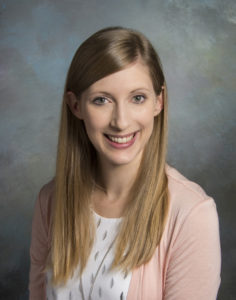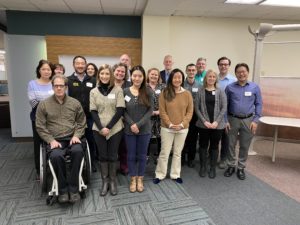It’s a dilemma faced by many students on financial aid. Funds often don’t hit accounts until a few weeks into the semester, so students can’t purchase textbooks, and they risk falling behind.

Melissa Wells, an assistant professor in UMW’s College of Education (COE), knows this scenario all too well. That’s why she’s designing an Open Education Resources (OER) textbook for her Foundations in Education course, thanks to a $10,000 grant from VIVA – Virtual Library of Virginia – a consortium of nonprofit academic libraries within the Commonwealth. News of the grant comes as educators nationwide celebrate Open Education Week, March 2 to 6.
As the cost of textbooks rises, so does the importance of providing access to personalized learning materials meant for diverse audiences. Buoyed by new Virginia legislation encouraging the adoption of open and affordable materials in higher education, Mary Washington professors like Wells are leading the way.
Her interest in OER was sparked, she said, when she began teaching at Mary Washington in 2017 and attended one of UMW Libraries’ open education workshops. It seemed like the ideal way to ease the burden on education students, who often have additional expenses, such as testing fees and transportation to local schools for unpaid practicum experiences.
“I quickly realized few education-focused resources existed, especially for introductory courses like the ones I teach,” said Wells, who continued to use a traditional textbook and reserved a copy in Simpson Library for those who couldn’t afford its $80 price tag. That proved more convenient for residential students than commuters, she said, and though she could share PDFs of the first chapter with her class, copyright and intellectual property laws prevented her from printing the rest.
Some professors overcome this cost conundrum by using existing OER textbooks – Wells herself is using one for a master’s level course she teaches. But she decided there was an advantage to writing her own with COE colleagues John Broome and Courtney Clayton.
“We all share an interest in equitable, culturally responsive teaching practices, and there’s little literature out there on this topic,” Wells said. “I’ve often joked that we needed to write a book to fill this void, and I realized OER was a great way to do that.”

She has sought advice from open education advocates on campus like professors Steve Greenlaw and Caitie Finlayson, who have both authored OER textbooks. Greenlaw leads Open UMW for faculty passionate about making course materials affordable and accessible. Finlayson secured her own VIVA grant with George Mason University professor Nathan Burtch to design the first-ever open laboratory manual for geography students.
Stafford Campus Library Manager Paul Boger, UMW’s Open Textbook Network leader, has seen a recent uptick of interest, with more faculty attending OER workshops, like the one coming up on March 25, and at least 10 open textbooks being used this academic year. UMW Libraries also offers a feature through Canvas that helps instructors incorporate e-books, database articles, videos and more into OER reading lists.
And the course redesign grant that Wells received from VIVA makes it easier and more cost-effective for professors to create their own materials. The ability to remix and update existing content also allows Wells to write the text with Virginia standards of teacher preparation in mind.
She plans to design her textbook using Pressbooks, an open book creation platform with built-in accessibility features for students who use screen-reading software and tools to assess comprehension of the text. The work will be widely available through VIVA’s digital library, and Wells hopes it will influence her students to use OER in their own classrooms.
“It allows them to work around the limited funding in schools to get the resources they need,” she said, “and tailor those materials to support individual student learning.”